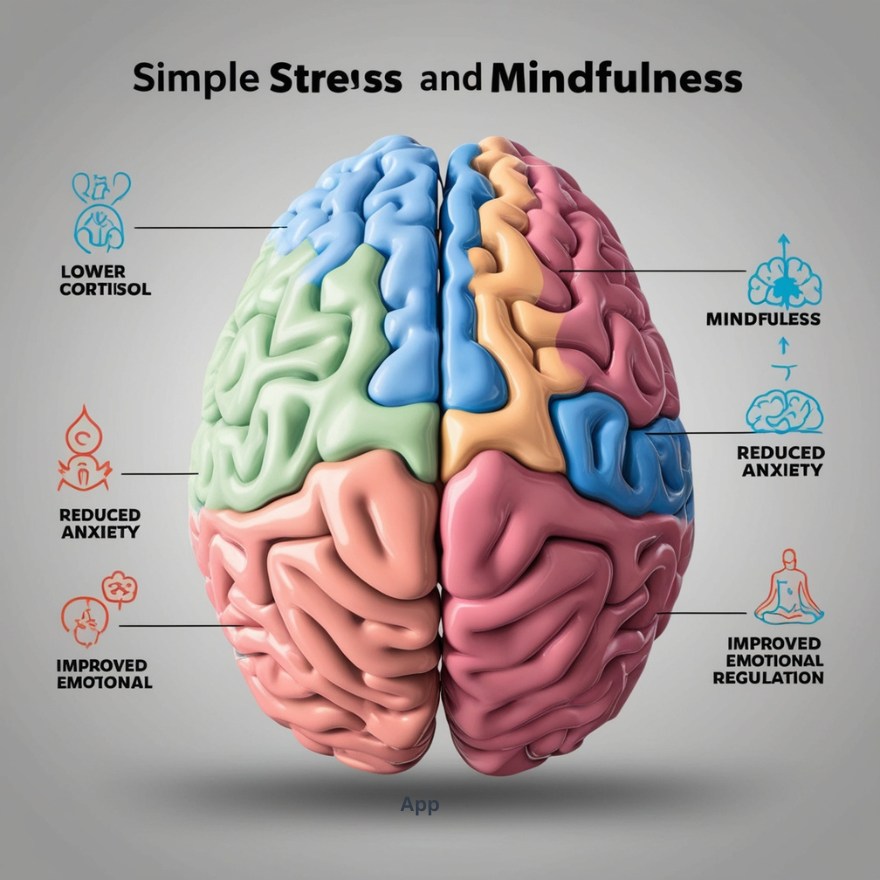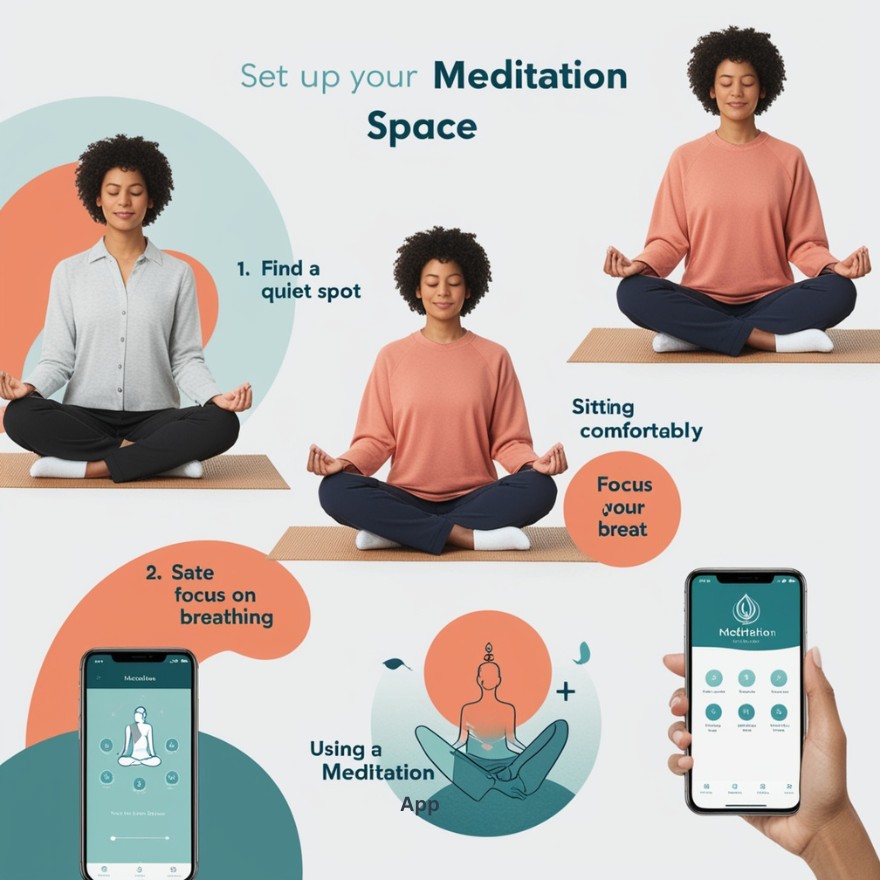Disclosure:
Thank you for reading this post, don't forget to subscribe!
Some of the links on this website are affiliate links. This means that if you click on the link and make a purchase, we may receive a small commission at no extra cost to you. Your support helps us keep the site running.Learn more on my Privacy Policy and Affiliate Disclosure page. Thank you for your support!

In today’s fast-paced world, stress is a common part of life, but left unchecked, it can take a toll on both your mental and physical well-being. Fortunately, there’s a growing body of research supporting mindfulness meditation as an effective tool for managing stress. Mindfulness is more than just a trendy buzzword—it’s a powerful practice that has been scientifically proven to reduce stress and enhance overall wellness.
In this post, we’ll explore how mindfulness meditation works, the many ways it can benefit your stress levels, and how you can start incorporating this practice into your daily life.
read more about: Power of Mindfulness: Techniques for Daily Practice-it’s a powerful practice that has been scientifically proven to reduce stress and enhance overall wellness.
What is Mindfulness Meditation?
Mindfulness meditation is the practice of focusing your attention on the present moment. It involves deep breathing and observing your thoughts and feelings without judgment. This helps you develop greater awareness of your emotional and mental state.
Unlike other forms of meditation, mindfulness doesn’t require you to clear your mind entirely but rather to acknowledge your thoughts and gently return your focus to your breathing or another anchor, like a mantra or body sensations.
related article: Mayo Clinic’s-The mindfulness practice-Meditation can wipe away the day’s stress, bringing with it inner peace. See how you can easily learn to practice meditation whenever you need it most.
How Does Mindfulness Meditation Help with Stress Relief?

Mindfulness meditation works by training the brain to remain calm and focused, even in stressful situations. Here’s how it can help relieve stress:
- Reduces cortisol levels: Studies have shown that mindfulness meditation can lower cortisol, the hormone responsible for stress.
- Improves emotional regulation: By practicing mindfulness, you become more aware of your emotional triggers, which can help you better manage your reactions to stressful situations.
- Increases relaxation response: Meditation triggers the body’s relaxation response, which can lower your heart rate and blood pressure, counteracting the effects of stress.
learn more about: 10 Surprising Benefits of Daily Meditation for Mind and Body Health-This blog post explores ten surprising benefits of daily meditation that go beyond relaxation, offering profound impacts on both mind and body health.
read next:
Benefits of Mindfulness Meditation for Overall Wellness
While the primary focus of mindfulness meditation may be stress relief, it also provides a host of other benefits that enhance overall well-being:
- Better Sleep: Regular mindfulness practice has been linked to improved sleep quality, particularly for those who struggle with insomnia due to stress.
- Enhanced Focus and Cognitive Function: Mindfulness trains your brain to focus, which can lead to better productivity and a sharper mind.
- Reduced Anxiety and Depression: By breaking the cycle of rumination (repeatedly thinking about negative events), mindfulness can reduce symptoms of anxiety and depression.
- Lower Blood Pressure: As mindfulness helps lower stress levels, it can also help reduce blood pressure, which is vital for heart health.
- Improved Relationships: Mindfulness fosters empathy, patience, and active listening, making it easier to form deeper, more meaningful connections with others.
Stay Ahead with Morningscape Mindset Media!
Sign up now to receive exclusive updates on our latest posts — delivered directly to your inbox!
How to Start a Mindfulness Meditation Practice

Starting a mindfulness meditation practice is simple, and it doesn’t require much time. Here’s a quick step-by-step guide:
- Find a quiet space: Set aside a few minutes in a quiet place where you won’t be disturbed.
- Focus on your breathing: Close your eyes and focus on your breath as you inhale and exhale deeply.
- Acknowledge your thoughts: It’s normal for your mind to wander. When it does, gently acknowledge your thoughts and guide your focus back to your breath.
- Start small: Aim for 5-10 minutes a day and gradually increase the time as you get more comfortable with the practice.
- Use an app for guidance: Consider using mindfulness apps like Headspace or Calm to help guide you through your meditation sessions.
Common Mistakes to Avoid When Practicing Mindfulness Meditation
Like any new skill, mindfulness meditation can take time to master. Here are some common mistakes to avoid:
- Expecting immediate results: Mindfulness is a practice that builds over time. Don’t get discouraged if you don’t notice immediate changes.
- Being too hard on yourself: It’s normal for your mind to wander. Be patient with yourself, and remember that mindfulness is about gently bringing your attention back to the present.
- Skipping days: Consistency is key. Even if you only meditate for 5 minutes, try to make it a daily practice.
- Not finding the right space or time: It can be challenging to meditate in a noisy or busy environment. Dedicate a specific time and place for your practice to avoid distractions.
Download: Free Guide to Mindfulness Meditation for daily tips and mindfulness exercises you can incorporate into your routine!
The Science Behind Mindfulness Meditation
The benefits of mindfulness meditation are not just anecdotal; they are backed by science. Research has shown that regular meditation can physically alter the brain. Studies using MRI scans have revealed that mindfulness can increase gray matter in areas of the brain responsible for memory, empathy, and stress regulation.
Furthermore, studies have found that mindfulness can lower the amygdala’s activity, the part of the brain associated with the fight-or-flight response, helping reduce overall feelings of stress and anxiety.
EXPLORE MORE:
Conclusion
Mindfulness meditation is a powerful and accessible tool for managing stress and improving overall wellness. Whether you’re dealing with the pressures of work, family, or health, taking just a few minutes each day to practice mindfulness can have profound effects on both your mental and physical health.
If you haven’t tried mindfulness meditation yet, now is the time to start. Begin with small, manageable sessions and watch as your stress levels begin to decrease and your sense of peace and well-being grows.
Have you tried mindfulness meditation for stress relief? Share your experience in the comments below, or reach out if you have any questions about getting started!
FIND OUT MORE: 10 Things Successful People Do to Maintain Mental Wellness.
RELATED ARTICLE: HealthGuide-the benefits of mindfulness.
MORE ABOUT:
health / fitness / wellness / nutrition
SHARE THIS ARTICLE












